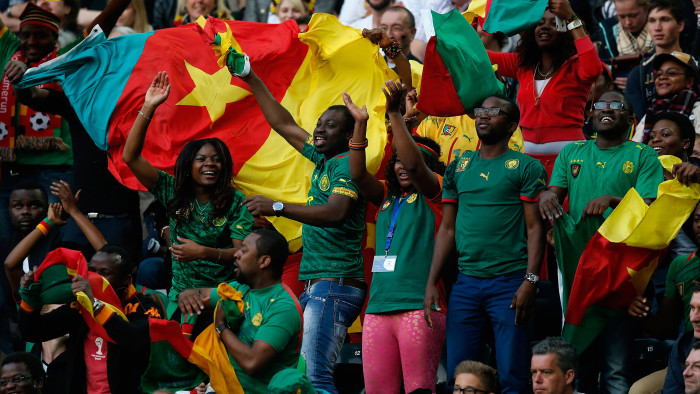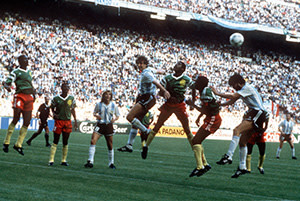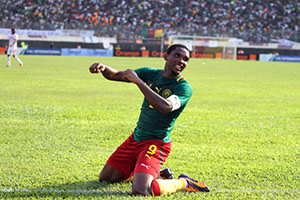Cameroon – the team with ‘hemle’ (and Samuel Eto’o) on its side

Roula Khalaf, Editor of the FT, selects her favourite stories in this weekly newsletter.
In Cameroon’s biggest city, Douala, we name streets and squares for the alcohol and sex trade (rue de la Joie), for corruption (Carrefour des Trois Voleurs, or Junction of the Three Robbers, for three officials who used public funds to build houses in the area), for violent deaths and footballers. All these names are unofficial. The only official names are those of the colonisers. Carrefour Eto’o Fils, the junction named for our striker and captain Samuel Eto’o, is in New Bell, the populous quartier where he was born. It is a few blocks from Place Roger Milla and Carrefour Thomas Nkono, named for past footballers. New Bell is Cameroon’s Soweto – revolutions begin here.
…
Hemle! This word from the Bassa language encapsulates good Cameroonian nationalism. Hemle is what the English call “pride”, but deeper. Rudolph Manga-Bell, founder of New Bell, tells the German colonisers to f*** off: hemle! Ruben Um Nyobe tells the French colonisers to f*** off: hemle! Both men get decapitated for their trouble but don’t let that get in the way of theory. Hemle is the raison d’être of the Bassa people of Cameroon’s south. Bassas have said “No” more consistently and resolutely than any other linguistic group in a country of 278 languages. They have produced Cameroon’s most famous intellectuals, revolutionaries, bar-ladies and footballers. Twelve of the 20 players who took Cameroon’s “Indomitable Lions” to the World Cup quarter-finals in Italy in 1990 are Bassa – including Roger Milla and Benjamin Massing. Massing’s famous “tackle” of Argentina’s Claudio Caniggia in the dying minutes of that opening match, another attempted decapitation, is pure aesthetics of hemle.
…
WORLD CUP SPECIAL

Italy
Exclusive interview with top player Andrea Pirlo
Spain
How the reigning champions plan to do it again
Argentina
Can Messi ‘the Messiah’ live up to his name?
England
Why are they so bad
at penalties?
Brazil
One man, a country’s hopes: superstar Neymar
Bosnia & Herzegovina
Their manager talks strategy for their debut World Cup
United States
How the US learnt to
love soccer
Colombia
Can the team affect presidential elections?
My friend Pele
An ‘imperialist Yankee’ reminisces
How to save a penalty
Dutch goalkeeper
Michel Vorm explains

It’s 1996. You have to get to Douala International Airport three hours before departure. You wait. You check in. Now it’s 23.30 and the flight was scheduled to depart at 19.30. Your parents are tired but refuse to leave. Your cousin tells you they never leave until after the plane has disappeared into the clouds. You say goodbyes, make promises and wait another hour in the departure area. Finally you board. And wait. The Cameroon Airlines flight is delayed.
In President Paul Biya’s Cameroon, the only right you have is to wait. For the president to die. For your salary. Will you be outed as a homosexual? Will you be caught by the épervier? (The rapacious bird is code-name for Biya’s anti-corruption drive, or rival-cleansing programme.)
You are travelling back to South Africa with your family. Your one-year-old son, Malik, is crying on your lap. The flight is overloaded. François Omam-Biyik, scorer of the opening goal of the 1990 World Cup and captain of Cameroon’s national team, doesn’t have a seat. You’d been waiting almost two hours when he walked in with 21 Lions, relaxed in yellow T-shirts and trackpants, sandals. They have been through this before.
At 3pm today the Lions will play the opening match of the African Cup of Nations in Johannesburg. It’s already 2am when the Boeing 737 starts to move. You look back: two players are still standing, another occupies a flight attendant’s seat. Shortly after take-off, the pilot announces that because of “unforeseen circumstances” he has to make a stop in Yaoundé, the capital. Panicked, you ask fellow passengers about the unforeseen circumstances – the air hostesses won’t speak. You learn that the players have refused to travel to South Africa without advance payment of their match fees. The presidency has agreed to pay and you’re going to fetch the money. The information circulates along the plane’s aisle like radio-trottoir (informal communication networks used primarily in urban Africa).
At Nsimaleng International Airport, the runway Biya built to avoid landing his plane anywhere near New Bell, you’re expected to wait inside the plane while the players meet “someone from the presidency” in the VIP lounge. None of the passengers complains, at least not loudly. You avoid the eyes of your South African wife. When the players return an hour later, you look for the money-briefcase but can’t see it.
After refuelling stops in Kinshasa and Harare, you land in Jo’burg around 10am. There’s a small group of Cameroonian fans waiting at the airport, looking as if they slept over – the flight is eight hours late. The players are ushered to a bus, probably headed directly to the stadium where South Africa’s Bafana Bafana hungrily await. You don’t look back.
You are now in your one-bedroom apartment in Cape Town. Your wife is on the phone, telling her family about real Africa. Your son is asleep. Your travel mates are on TV. South Africa’s Shoes Moshoeu picks up the ball near the halfway line. He wrongfoots the first defender, finds Phil Masinga between two others and goes backdoor; Masinga backheels. Shoes is clear, looks up, inside right foot: South Africa 3 – Cameroon 0.
Later your friend Sandile calls from FNB Stadium – you are the only Cameroonian he knows. “Shoooooes!” he screams. You are silent. Telling him about the flight would sound like an outrageous excuse. You met Sandile at a Mozambican club in Yeoville, Johannesburg. You’d been in South Africa two months and had your first football conversation with him. You told him about le pied camerounais, the Cameroonian foot. You said you’d been taught to play the man, not the ball. You quoted your youth coach: “Man pass, ball no de pass. Ball pass, man no de pass.” You reminded him of Massing’s tackle. You told him that was Cameroonian football, to put one’s foot down.
…
There are two types of instruments in Cameroonian football – le pied camerounais and le pied étranger: local and foreign feet. In the final quarter of the past century, our local feet dominated African football. As a product of La Fábrica, Real Madrid’s youth academy, Samuel Eto’o owns at least one foreign foot.
…
It’s 2013. Cameroon Airlines is bankrupt and its former boss was caught by the épervier. Malik is spending his 18th year living with your parents in Limbe. Every afternoon he plays football at the school opposite the family home. He tells you he still feels foreign even though he’s been coming here every year of his life. You think that along with his lighter skin, South African accent and Afro, his pied étranger is rejected. You can only give words of encouragement.
A month later he tells you he might join the neighbourhood team. What happened?
“I don’t know really, I think I am just playing like everyone here now.”
How is that?
“You know, you have to put your foot down.”
…

The central question in New Bell’s bars is: can le pied étranger play hemle? It is also the quest of Samuel Eto’o, proud son of the Bassa. Eto’o has learnt, painfully, that rewarding the loyalty of his teammates with expensive watches, as he did at the 2010 World Cup, wouldn’t suffice; neither would everything he has won in Europe. Can he show hemle?
Every time Eto’o visits New Bell the elders tell him about Milla. On April 26 1981, Cameroon needs to beat Zaire by three goals to reach the final round of African qualifiers for the 1982 World Cup. Milla tells Cameroonians, on national radio, that he will score four goals against Zaire – an extra goal, just in case. And he does.
Eto’o hears stories about Joseph Antoine Bell, who grew up in New Bell’s notorious prison, then became captain of Marseilles in 1988, stood up to the club’s chairman Bernard Tapie and ate the bananas and groundnuts that racist fans threw at him during matches.
Would Eto’o ever put his foot down?
…
It’s the final round of qualifiers for the 2014 World Cup. Cameroon’s Afropolitan brigade lead Tunisia 2-0 at halftime in Yaoundé. This squad of Lions include more métis than any other in history, you’d think it was the South African team. Only two players in this squad have ever played in Cameroon’s league. Most grew up in France.
You are watching in your father’s house in Limbe. You took the TV to his bedroom. You have just lost your mother and, as a widower, he is not allowed to leave the “conjugal space” for months – his in-laws will let him know when it’s OK to come out. You watch the game in silence.
A TV crew is in the Lions’ changing room at half-time. Captain Eto’o is preaching, while the players and coaches hold hands in a circle around him: “As young boys we all dreamed of becoming great players. We were lucky to achieve this. We wanted money, God granted us money. We wanted to play in the national team, He granted us that too! Today we have our mission. F***! There are only 45 minutes left in this game and we’re leading 2-0. But f***ing shit we have to keep the mindset of the very first second. The score is 0-0! Guys, I repeat, 0-0! We kill the game here! But with our heads, guys. It’s not the time to start playing like Pelés [or perhaps he says “pédés” – gays – you’re not sure]! We are the Lions. Let’s go collect our qualification! [Screams from all the players].”
Cameroon win 4-1. Hemle and le pied étranger take us to Brazil.
Ntone Edjabe is the founder of Chimurenga magazine.
To comment on this article please post below, or email magazineletters@ft.com
Comments